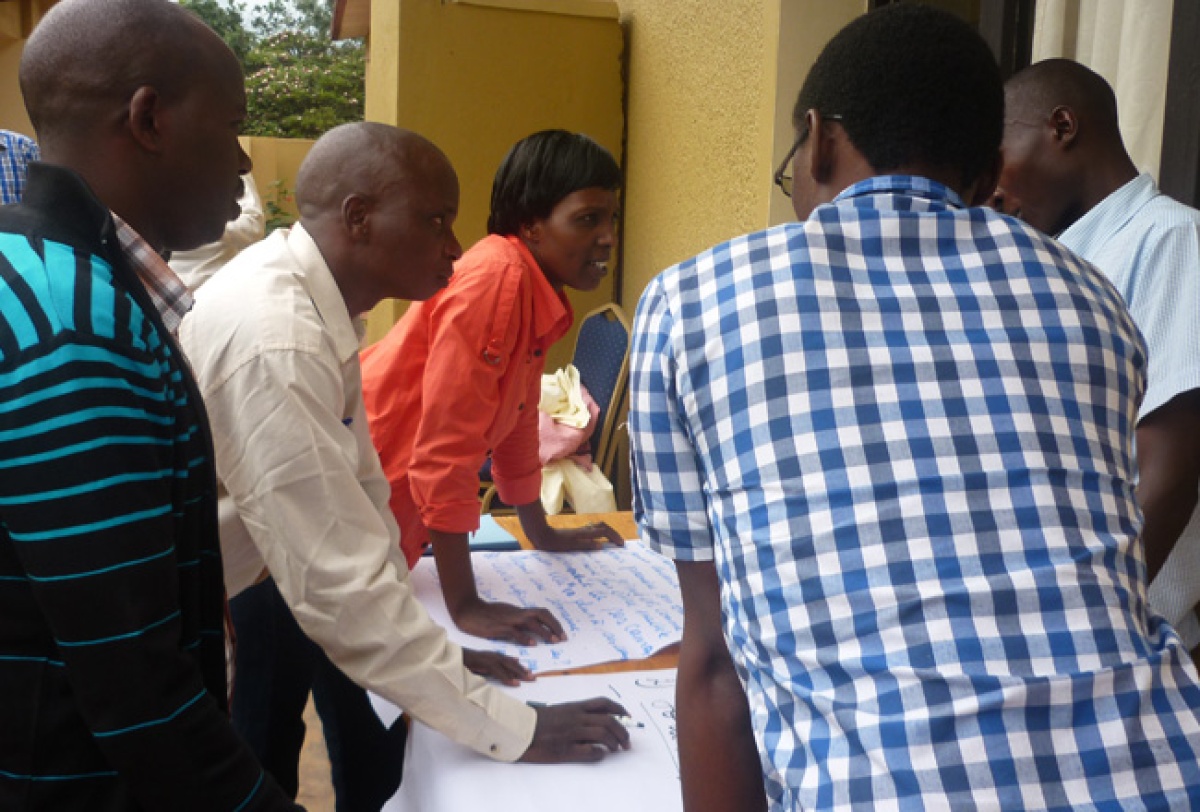Training the Trainers to Fight HIV in Rwanda
Posted on Sep 6, 2013

Fifteen doctors, nurses, and HIV specialists are bunched in small groups, writing on chart paper and engaged in animated discussions that echo through the small room at the Rwinkwavu Hospital Training Center in eastern Rwanda.
“Why don’t you start?” a nurse asks a member of her group. “You can invite participants to volunteer in a role-play about how to counsel serodiscordant couples [where one partner is HIV-positive and the other isn’t]. Then, I will ask for feedback about what the nurse did well in the role-play and what could have been improved.” Further discussion of teaching methodology ensues, and after a few moments the group is writing out ground rules and expectations for the exercise.
The 15 participants are in the middle of a weeklong “Training of Trainers” session. Manzi Anatole, director of quality improvement at PIH’s Rwandan sister organization Inshuti Mu Buzima (IMB), floats around the room offering feedback and support as the groups work to craft HIV training activities that they’ll soon be facilitating in their respective districts around the country.
Together, IMB and the Rwandan Ministry of Health launched the National Training of Trainers (TOT) model for HIV providers and program leaders. It’s a new way of working with Ministry departments and clinicians to improve the quality of training throughout Rwanda. By the end of the week, everyone here will be qualified HIV trainers.
“This is an innovative strategy to improve training methodology for clinicians in Rwanda. Many of these providers have not yet participated in a TOT to build competency in the skills necessary for high-quality training; we are working with the Ministry to address this challenge,” says Chadi Cortas, IMB’s director of medical education and training. “This new model should improve training quality across Rwanda’s 30 districts.”
TOT participants pass through three phases: Phase I introduces adult education methodologies and allows participants to apply their new knowledge through use of PIH’s HIV curriculum; phase II is where the trainers train other HIV health professionals in participatory methodologies; and in phase III, where they become “master trainers,” participants learn to design training materials themselves.
The importance of skilled trainers cannot be overstated. For efforts such as PMTCT—the prevention of mother-to-child transmission of HIV—guidelines and protocols change frequently, and so program leaders are often asked to train colleagues on new standards for delivering care. Without sufficient integration of high-quality methodology into program development, trainings can be time-consuming activities that do not always enhance participants’ clinical skills.
TOT also supports the Ministry of Health’s push toward “task-shifting,” or delegating tasks traditionally reserved for doctors to nurses and community health workers, a process that depends heavily on effective training initiatives that can be shared and replicated throughout the country.
“Task-shifting is very important for our national strategy for improved health care provision. In order to achieve this, we need skilled trainers to ensure that health providers are able to take on new responsibilities,” explains Dr. Aimable Mbituyumuremyi, the national coordinator of task-shifting who has been at the forefront of the TOT initiative.
Now Mbituyumuremyi, who’s one of the eight current advanced trainers, is preparing to transition into a new program for master trainers. Beginning this fall, he’ll attend workshops designed to teach clinical leaders how to independently develop and revise participatory curricula. With these newly acquired skills, the master trainers will play a hands-on role in shaping future training initiatives for Rwanda.
“We expect this program to lead to the formation of a cadre of HIV professionals who are highly skilled in training methodologies and curricular design,” says Celia Reddick, IMB’s outgoing curriculum and training specialist. “Ultimately, we hope this model will spread beyond the HIV division to inform future training initiatives.”
Indeed, with training continuing to play a vital role in the Ministry of Health’s work, this partnership is sure to set the stage for a new wave of health leaders and educators and to serve as a model for future partnerships that support clinical training.
Emma Hiza is the incoming curriculum and training specialist at Partners In Health in Rwanda.

